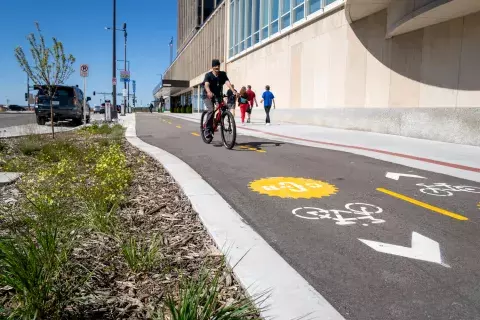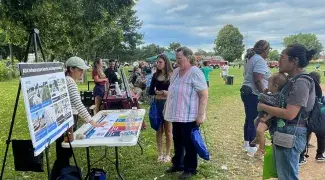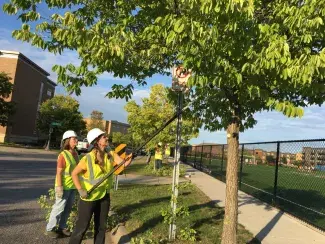Building Resilience Citywide
About the City's Climate Action and Resilience Plan
The Saint Paul Climate Action and Resilience Plan (CARP) lays out a vision for our climate future. It's a roadmap toward:
- Making Saint Paul carbon neutral by 2050
- Preparing for climate impacts and prioritizing equitable solutions
What's included in the plan?

The plan commits the City to take climate action by:
- Reducing emissions through energy efficiency
- Transitioning to renewable energy
- Supporting sustainable transportation options
- Cutting waste
- Enhancing urban resilience
Specific goals of the plan include:
- Increasing clean energy usage in buildings
- Expanding public transit and bike infrastructure
- Protecting natural ecosystems
A commitment to equity is central to the plan. We're committed to ensuring all residents benefit from the City’s actions, especially those most affected by climate change. These communities are often low-income, and people of color who live in neighborhoods with racial disparities.
The City is collaborating with community members, businesses, and others to plan for our climate future. Together, we're reducing emissions, improving air quality, creating green jobs, and building a city ready to thrive in a changing climate.

How was the plan created?
Research, community input, and expert collaboration all contributed to the current plan. It uses 2015 as the baseline year to assess emissions. CARP set a goal of carbon neutrality by 2050. This includes initiatives to reduce greenhouse gas emissions and strategies to improve resilience.
The plan integrates strategies to address broader issues like housing, transportation, and workforce development. It promotes benefits such as improved air quality, public health, and economic opportunities.

How is the plan used?
The plan provides a framework to:
- Achieve carbon neutrality by 2050
- Address the local impacts of climate change
The City uses the plan to inform policy decisions and prioritize investment. The plan provides strategies to:
- Reduce emissions
- Enhance resilience
- Improve equity
It focuses on areas with the greatest potential impact. These include energy efficiency, home weatherization, and sustainable transportation.
The plan’s metrics and benchmarks allow the city to track progress.
View the Climate Action and Resilience Plan
Featured Video: 2025 Climate Forum
When we care for our climate, we care for our people. At the 2025 Climate Forum, Mayor Carter reviewed our City’s climate action. He outlined a path toward resilience for all of Saint Paul.